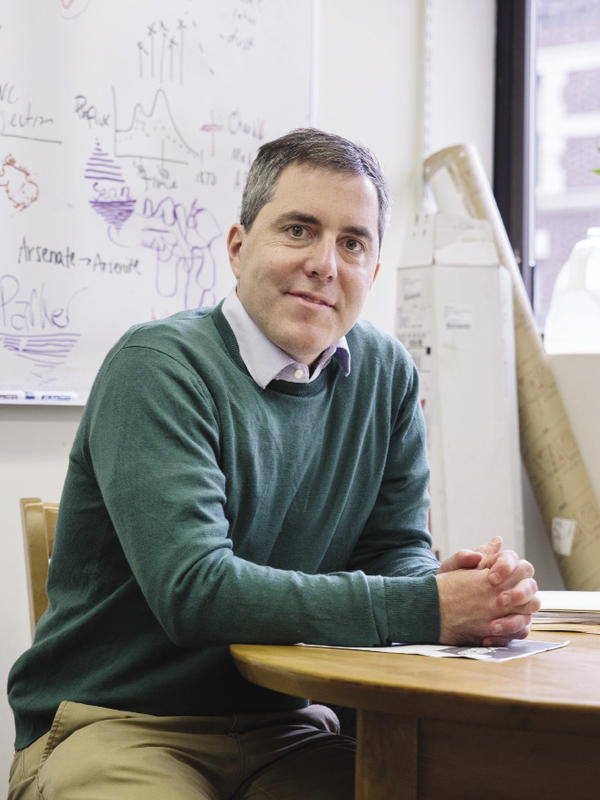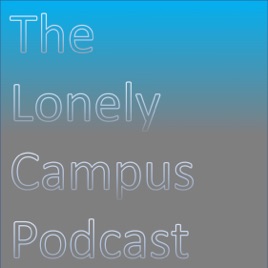Interview with Brian Mailloux, Professor in Environmental Science and Co-Chair, Environmental Science Department
 The current pandemic and #CovidCampus context that we now face happened quickly and is without precedent in terms of schools and universities needing to continue almost every aspect of their work online. Please describe the courses you are teaching this semester and what the transition has been like.
The current pandemic and #CovidCampus context that we now face happened quickly and is without precedent in terms of schools and universities needing to continue almost every aspect of their work online. Please describe the courses you are teaching this semester and what the transition has been like.
I'm lucky in some ways: I'm only teaching one course this semester. I am Co-Chair of the department and so I end up with a course release and so this was the semester I'm only doing one course. I am teaching a First-Year Seminar and our seminar is called Sustainability. The idea of that class is that we read a wide range of environmentally-based texts. We start by reading a little bit of The Bible and Genesis and in those texts there’s a lot about what it means to have dominion over the earth and continue to the 1900s to read John Muir, Gifford Pinchot, Rachel Carson, The Population Bomb by Paul Erlich, up until present day developing world issues. It’s a wide, fun course - usually we talk about optimism and pessimism and what we are getting right and what we are getting wrong. It’s a fun course for discussion. So, what happened is that we were halfway through the course and it all got blown up.
The First-Year Seminar is really there to try to get students to get engaged and thinking. And so, the good thing with them is that you have more flexibility. It’s not Calculus I or a math course where you have to hit certain milestones. I felt like that took some pressure off of me. When the switch to online came, I made sure to go online that first day and make sure we could all go online. I think today might be the first time I had a student miss a class so that was really encouraging. The students are coming to class each day even though the classes are far from perfect. But we are still discussing and talking and we are trying new things. What I decided to do as a class which is very different and what I already do for some of my other classes is that I create podcasts. If we do a reading in class, I’ll try to call the author of that reading and talk to them about it. I do about one a year and the students like that because then they hear the author or another person's perspective. I have them on iTunes you can download them. It works really well.
And so, when this transition happened I was thinking to myself, "What could we do to sort of give the students a unique perspective?" That is what we are doing here: we are trying to all make a podcast about some aspect of the experience. That is in progress. So, I paired back some of our readings - it’s just harder to discuss them online. I said, “Let's go for critical readings and we’ll focus on them.” Today we were having a discussion and I tried to make sure I put someone in charge of each section to make sure everyone got talking and doing something. I'm still figuring how to do this. It's not as free-flowing as if you were in class. You want to get everyone up and talking. I'm doing my discussions ahead so everyone is in charge of every section. We worked through it. It went alright. It was nice and we had some good discussions. On top of that, we are trying to have everyone to make a podcast about some aspect of their experience in a podcast series called “The Lonely Campus”.
Every student in your course is making a podcast?
Yes! They are not going to be very long. It's funny - the first time I proposed this you could just see the look on zoom, "Holy crap, my professor is crazy!" like they could've reached through the screen and done me in!
How are the students acquiring the skills to make the podcasts?
Some of them have the skills already. I'm trying to teach them too as we are going through it. I told them, "Look, I’ll make the first episode” and then I said, “If I can do it, you all can do it." We are going through it and in every class, we are going through our plan. The goal is that they’re all finished by the end of the semester. I published my first episode and I have a second episode coming out. I was also trying to teach the students what websites to use, how to upload it to iTunes. Hopefully we'll make it! I don't know – this is a big experiment - to do this online also where you can't help them in person. It’s tricky. But I thought this would give us something new to strive for.
So that is what I've been doing online. I do not know online learning but it seems people who do online learning design a class a certain way for online learning. We are not there. And then so many of our students I think have more technical issues than you'd think making it to class. I think my students have been good but you hear about students having trouble getting online each day. And even with me - I'm home and I live in faculty housing, but there will be times where four of us are online. The kids are doing classes and I'm trying to teach. It’s just hard. It means you have to have four good computers. I used to think “We have plenty of computers at home.” But we don’t. We have to use our phones sometimes – computer Wi-Fi can be slow. So, I figure if I'm having issues here, then a lot of people have to be having issues.
It sounds as though the content of your course – as is the case with many courses - could have an interesting valence under our current circumstances. Could you discuss the ways in which the Covid19 crisis may have led you to modify your course materials or have a particular emphasis in your class discussions?
I did make a couple of changes. Today's discussion was really good. We read Garrett Hardin’s "The Tragedy of the Commons,” a classic environmental paper about what happens when people overuse the commons. We read that a couple of weeks ago and then there is a follow-up paper called "The Struggle to Govern the Commons," by Thomas Dietz et al. about how you actually govern the commons. It has all these big picture recommendations for how to govern and manage a difficult situation when there are a lot of multiple interests: local, national and global interests. And it was amazing because some of these recommendations are for transparent data that readily communicated and multilayer management. It has all these different recommendations and you can see exactly what's working and not working in our current crisis and in reading it you can see "Oh, we need more of this" or "This is missing" and “This is why this is working.” So, it was fascinating to be reading the struggles to govern the commons today as that is exactly what we we’re doing. I left that reading in the syllabus on a purpose because I knew it would hit home.
There are some interesting environmental data coming out now that you see air quality cleaning up, and other things so we've talked about that a little bit, but I haven't figure out new readings to do yet. I got rid of one of the readings we usually read Behind the Beautiful Forevers: Life, Death, and Hope in a Mumbai Undercity by Katherine Boo, a Barnard alum. It's beautifully written; it’s a beautiful book. It follows a group of people in a Mumbai slum for a year and just describes their situation and what happens that year. And it is so freaking tragic. It’s beautifully written, but it's sad and I'm just like, we just can't do it this year. I fear we all can't handle that book for the spring. So, I’m like, “We’re cutting that one out.”
Could you discuss some new pedagogical ideas or resources that you are thinking about for the rest of the course to maintain instructional continuity, either that you’ve found on your own or in cooperation with your colleagues?
I'd say the nice thing is that the First-Year Seminars co-directors Laurie Postlewate and Pam Cobrin have doing a lot of work trying educate the first-year faculty and I’ve found that really helpful. They are trying to keep us moving forward and helping the students. There are a lot of people on campus who have been really helpful, reminding us to “try this” or “don’t forget this” and I’ve found all the work people are trying to do really helpful and I’m really thankful for it. This way, I'm not as lost. I'm like, “Okay, I’ll try this.” I’ve found it comforting. Hearing other people talk about what has worked and hasn’t – I’ve also found that helpful.
I’m sort of bummed, because the Media Center recently had a zoom class about how to do a podcast and it was really good – and then I was thinking that I wish I were on campus because I would have integrated with them. If I do this again going forward, there are all these resources! I hope in the future I’ll take more advantage of them.
Could you share any research that you’re working on and/or any ‘pleasant surprises’ that you’d like to highlight of your transition online?
We are helping a post-doc at Columbia at the Earth Institute, Megan Maurer. She studies how greenspace impacts well-being. We’re trying to do surveys of Barnard undergrads to see how access to green space is impacting their time now. It’s a really interesting study and it will be interested to see how it plays out. The nice thing is that we can do it at Barnard because the Office of Institutional Research is really great.
As I go forward in my course, it’s going to take more practice to make the discussion going better in class and I'm working to try to improve that. I think that's because my main concern is, "How do I keep class discussions going at some level?" We’ll see how that goes.
